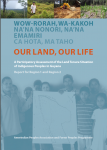FPP statement on Survival International's complaint against WWF
22 Dec 2016
Following the recent article in The Ecologist by Lewis Evans of Survival International concerning a complaint to the OECD brought by Survival against the Worldwide Fund for Nature (WWF), Forest Peoples Programme has received some queries regarding our view of the situation in Cameroon (where we have a substantial programme working alongside forest indigenous peoples). FPP has limited knowledge of the specific facts of the complaint made by Survival International and cannot corroborate its contents.









